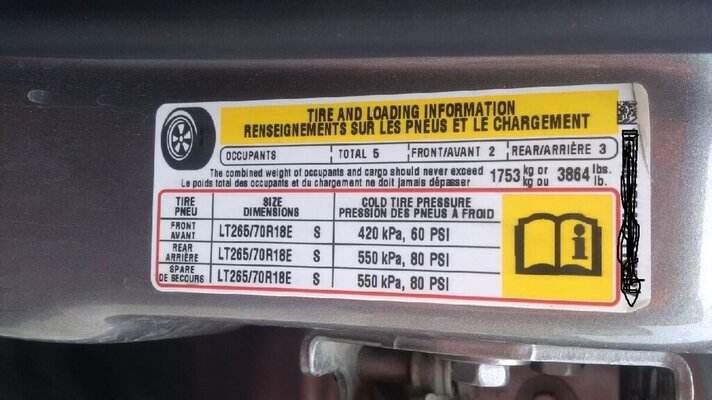Hello,
I'm brand new to travel trailers. I've towed many boats & utility trailers but never worried about capacity because they were smaller trailers. I have a 2007 Chevy Silverado and the specs are here(as I read them (under Tech Specs tab)):
But I also wonder if I'd put the max payload (1755 lb) in my truck and over 1059 lb in the trailer (to exceed 6000 lb camper, which is the max trailer weight according to GCWR). In my truck I account for gas (26g * 8.6 = ~225 lb), 2 adults & 2 kids (~450 lb), & gear (~150 lb); totaling ~825 lb which is under the payload max (do I need to add hitch weight to the payload? If so, still under payload but closer with the bigger trailer.) In the camper I account for full gray and black tanks (figured not all 3 tanks would ever be full while towing) as well as gear and liquids that won't be drained (6 - 10g I figure).
So my question is, being a first time travel trailer owner and tower is the lighter single axle trailer (Salem FSX) or the heavier tandem axle trailer (Wildwood) a smarter way to go?
Thanks,
Peter
I'm brand new to travel trailers. I've towed many boats & utility trailers but never worried about capacity because they were smaller trailers. I have a 2007 Chevy Silverado and the specs are here(as I read them (under Tech Specs tab)):
- UVW: 5245 lbs
- GVWR: 7000 lbs
- Payload: 1755 lb
- GCWR: 13000 lb
- Max Trailer Wt (w/WDH): 7500 lb
- Max Hitch Wt (w/WDH): 1125 lb
- Salem FSX 178BHS
- UVW: 3749 lb
- Payload: 1081 lb
- GVWR: 4830 lb
- Hitch Wt: 430 lb
- Salem Wildwood 230BHXL
- UVW: 4941 lb
- Payload: 2753 lb
- GVWR: 7694 lb
- Hitch Wt: 694 lb
But I also wonder if I'd put the max payload (1755 lb) in my truck and over 1059 lb in the trailer (to exceed 6000 lb camper, which is the max trailer weight according to GCWR). In my truck I account for gas (26g * 8.6 = ~225 lb), 2 adults & 2 kids (~450 lb), & gear (~150 lb); totaling ~825 lb which is under the payload max (do I need to add hitch weight to the payload? If so, still under payload but closer with the bigger trailer.) In the camper I account for full gray and black tanks (figured not all 3 tanks would ever be full while towing) as well as gear and liquids that won't be drained (6 - 10g I figure).
So my question is, being a first time travel trailer owner and tower is the lighter single axle trailer (Salem FSX) or the heavier tandem axle trailer (Wildwood) a smarter way to go?
Thanks,
Peter

